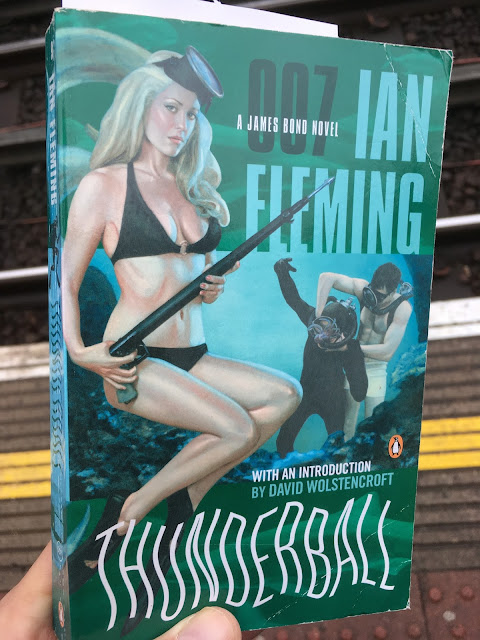I wanted to read a James Bond novel by Ian Fleming, having only read the
pastiche by Kingsley Amis. Thunderball, filmed in 1965 (and then remade in 1983 as
Never Say Never Again), may not have been the best place to start.
There’s a lot wrong with this book. It certainly hasn’t dated well. Some of the lines are pure Alan Partridge: “Petacchi inched the great nose of the plane down. Any moment now! It was going to be easy! His fingers played with the controls as delicately as if they were the erotic trigger points on a woman. Five hundred feet, four hundred...”
Plus, and perhaps unsurprisingly, it’s almost ridiculously sexist: “Women are often meticulous and safe drivers, but they are very seldom first-class. In general Bond regarded them as a mild hazard and he always gave them plenty of road and was ready for the unpredictable. Four women in a car he regarded as the highest potential danger, and two women nearly as lethal. Women together cannot keep silent in a car, and when women talk they have to look into each other’s faces.” The same chapter also states that the driving mirror is “an accessory rarely used by women except for making up their faces”.
No one could get away with this now: “there was an earthy warmth in the cheeks that suggested a good healthy peasant strain from the Italian Alps and her breasts, high-riding and deeply V-ed, were from the same stock. The general impression, Bond decided, was of a wilful, high-tempered, sensual girl – a beautiful Arab mare who would only allow herself to be ridden by a horseman with steel thighs and velvet hands, and then only with curb and saw bit – and then only when he had broken her to bridle and saddle.
”
Thunderball is slow to get going. Even when it does get going, it’s dull: there’s a strange lack of suspense. For a thriller, it simply lacks thrills. There’s a lack of narrative tension and action. For much of the plot you have the frustration of watching Bond slowly learn what you, the reader, learned more than a hundred pages back. Even when the “big climax” finally arrives, it amounts to little more than an underwater scuffle between scuba divers. The fact that the entire world is in peril – owing to the theft of two atomic bombs – is oddly not milked for the drama that that fact should present.
If it’s worth reading at all, it’s for the little insights into Bond’s character: “Bond loathed and despised tea, that flat, soft, time-wasting opium of the masses, but on his empty stomach, and in his febrile state, the sugary brew acted almost as an intoxicant. Three cups he reckoned had the effect, not of hard liquor, but of just about half a bottle of champagne in the outside world, in real life.”
Then there’s the peculiar section at the health farm: “Was his personality changing? Was he losing his edge, his point, his identity? Was he losing the vices that were so much part of his ruthless, cruel, fundamentally tough character? Who was he in process of becoming? A soft, dreaming, kindly idealist who would naturally leave the Service and become instead a prison visitor, interest himself in youth clubs, march with the H-bomb marchers, eat nut cutlets, try and change the world for the better?”
But, curious psychology aside, this is one of the worst novels I’ve ever read.




